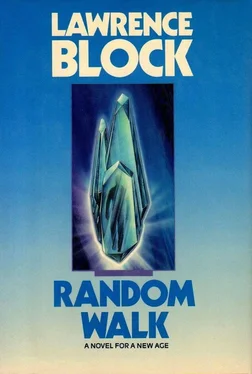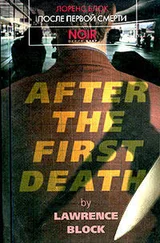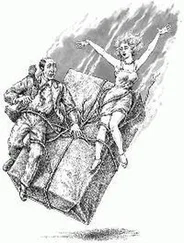“What’s going to happen, Mom?”
“He doesn’t really know,” she said. “Since he doesn’t know exactly what’s wrong with me, he can’t tell exactly what will happen next. My condition could just spontaneously arrest itself; the deterioration could stop of its own accord. Or it could clear up completely.”
“Or?”
Softly she said, “I think I’m going blind, Thommy.”
“You think so, huh?”
“I’m pretty sure of it.”
“Do you know—”
“How much time I’ve got? Not too long, I don’t think. He wants me to see a specialist.”
“You better go right away.”
She shook her head. “I’m not going.”
“Why not?”
“Because it won’t do any good.”
She thought he’d argue with her, or ask her how she could be so sure, but instead he said, “Mom? Are you scared?”
“This tea’s good,” she said. “I’m probably spoiled now, I’ll want cookie crumbs in it all the time.”
“Are you scared, Mom?”
“No,” she said. “No, I’m not. Funny, isn’t it?”
She did some counseling at Indiana-Fort Wayne, and if one of her clients had said the same thing she would have labeled it denial. How could you fail to run the gamut of negative emotions at the prospect of blindness? One of her senses, perhaps the chief one, was being taken away from her. Her world was shrinking and turning dark around her. How could she react other than with fear and rage?
Yet, from the beginning, it had not felt like deprivation. It had felt like a gift. From the onset, when she started catching flashes of white light out of the corners of her eyes toward the end of the day, and then when her field of vision began to have an occasional halo around it, from those first symptoms she had sensed that more was being given to her than was being taken away.
She was not being singled out for punishment. Rather, she was being chosen for something. For something important.
Charming, her professional self commented. Instead of paranoia, she was opting for grandiosity.
Except she didn’t feel grandiose. If anything, she felt curiously humble.
She was forty-one years old, the widowed mother of a thirteen-year-old boy. She stood five-four in flat shoes and weighed 105 pounds. Except for her pregnancy, her weight had not varied by more than a pound or two since college. It stayed the same, irrespective of her diet. The great majority of the female students she counseled, and not a few of the males as well, had some sort of problematic relationship with weight and food. Many struggled with their weight, and some had serious eating disorders, anorexia and bulimia. Half the world was hungry, she sometimes thought, and the other half was either starving itself or alternately gorging and vomiting.
She had a heart-shaped face, a strong straight nose, a small mouth. Her forehead was broad, with a sharply defined widow’s peak. Ten years ago, weeks after a drunk driver had crossed the centerline on State Road 37, she had found herself wanting to change her hair style and combing tentative bangs down onto her forehead. Almost immediately she’d realized what she was doing, trying to deny her widowhood by covering her widows peak.
The hair had been dark brown then. Now it was a soft gray and she wore it as she’d been wearing it for twenty years, falling evenly to within an inch of her shoulders. Her eyes were also gray, a surprising shade a full tone deeper than her hair. They were no less imposing to look upon now that they had begun to lose their function.
Since he’d already spoiled his dinner with Oreos, she didn’t bother cooking. They had a pizza delivered and ate it in front of the television set. Neither of them watched; he was doing his homework, and she had her eyes closed and let her gaze turn inward.
He said, “Mom? This is gonna sound dumb.”
“I’m glad you warned me.”
“Well, here goes. Uh. Is there something you don’t want to see?”
“Oh, God.”
“Well, I just thought—”
“I thought the cobbler’s kids were supposed to go barefoot. But what about the psychologist’s kids?”
“Psychobabble, huh? I’m sorry.”
“Don’t apologize, Thom.” She opened her eyes, surprised for an instant by the smallness of her field of vision. Her mind’s eye still had a wide screen, and it was as if she saw less now when she opened her eyes.
She said, “I asked myself the same thing. On a metaphysical level everything that happens to us is the result of a choice we make. Even your father, on some level or other he elected to be in that accident—”
“I still don’t get that. I mean, he was driving along minding his own business, right? And some drunk came sailing at him from out of nowhere, and it’s his fault?”
“I didn’t say it was his fault.”
“You said he chose it. He called up somebody and had an accident delivered.”
“Why do you think he just happened to be there?”
“Because he was coming home, wasn’t he? He was on his way home.”
“So it was just bad luck, huh?”
“I guess.”
“Coincidence.”
“Right.”
“Well, you can believe in luck and coincidence, Sport, or you can believe that they don’t put pepperoni on your pizza unless you order it that way.”
“So Dad had this desire to get killed in a car wreck and—”
“Well, to die.”
“And it went into some computer up in the sky, and they dispatched a drunk driver to do the job.”
“Well, something put them in the same place at the same time.”
He was silent for a moment. Then he said, “Why did Dad want to die?”
“I don’t know.”
“You blame him for dying, huh?”
“Not anymore.”
“You used to?”
“Oh, God, yes. How could he do that to me? To us? Leaving us all alone like that, the son of a bitch. Survivors are usually angry with loved ones who die, unless they’re too occupied with feeling guilty for having survived. Or unless they just stuff the feelings and aren’t aware of them.”
“I can’t remember how I felt. It was a long time ago.”
“I know.”
“Sometimes I think I can remember, but it’s like unrolling the toilet paper. I remember that it happened, but I don’t really remember . Are you going to have the last piece of pizza?”
“Take it.”
“Are you sure? I already had three.”
“Take it.”
“Thanks. Can I ask you something? If Dad chose to be in a car wreck, aren’t you choosing to uh—”
“Go blind.”
“It’s hard to say the word.”
“It’ll get easier. Yes, of course I’m choosing it, but I don’t think it’s because there’s something I don’t want to see. I think there’s something I do want to see.”
“I don’t get it.”
She closed her eyes. “I think,” she said, “that I’m going to be able to see far more with my eyes closed than I was ever able to see with them open. Thom, ever since I started to have trouble with my eyes, I’ve been getting glimpses of things.”
“What kind of things?”
“It’s hard to explain. At first it would happen at night when I went to bed.”
“Like dreams?”
“No, not like dreams, because it would happen while I was awake. I would close my eyes and I would start to get pictures. Almost like watching a movie, except that when I tried to focus in on an image I would lose it.”
“I get things sometimes. Like if I stare at a light and then close my eyes, and you get these colors, and they sort of change color and finally fade away.”
“This is a little different.”
“What kind of things do you see?”
“All kinds. Scenery. People’s faces. Sometimes they’ll be having a conversation.”
Читать дальше








